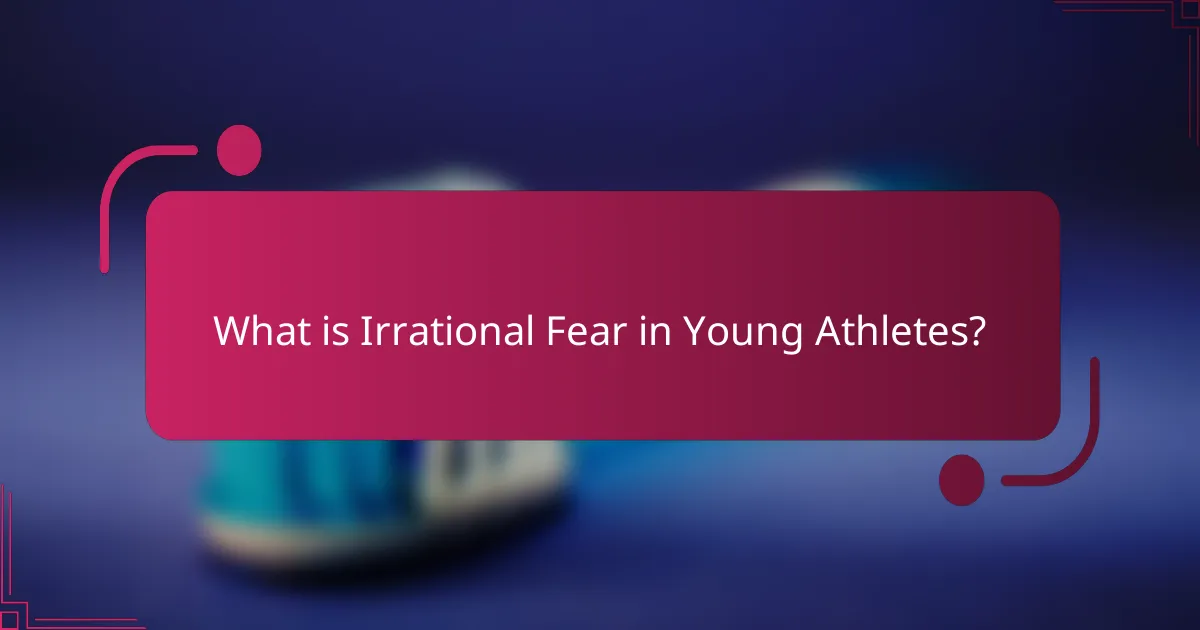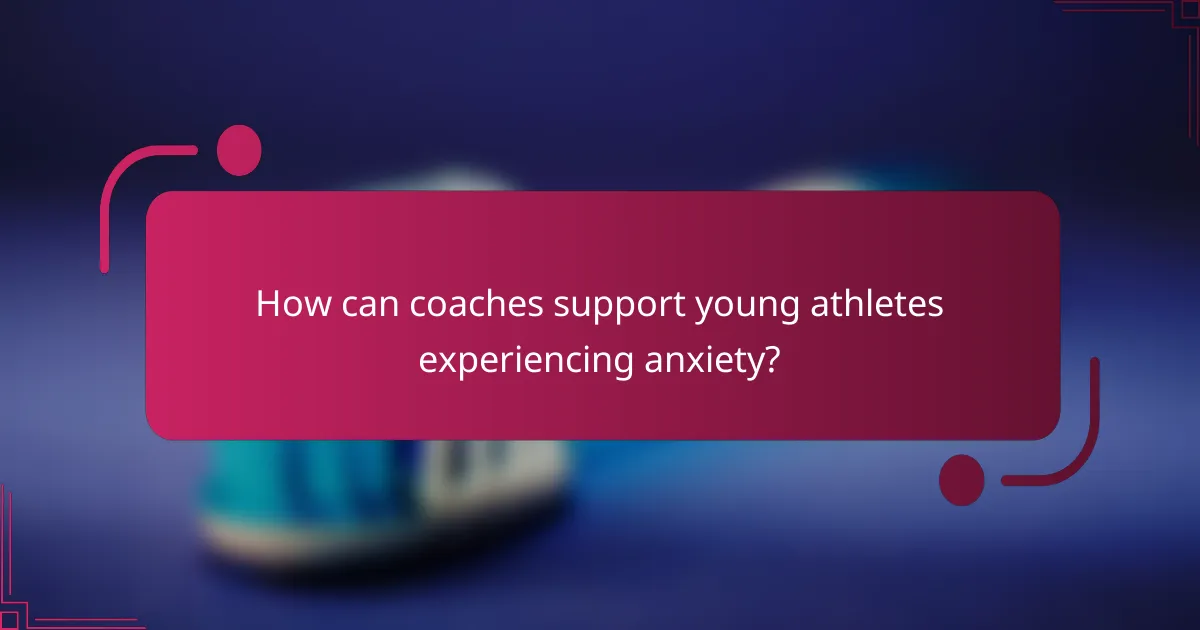Irrational fear in young athletes significantly impacts their performance, leading to excessive anxiety and avoidance behaviours. This article explores the sources of anxiety, including pressure from coaches and parents, and the effects of social comparisons. It discusses techniques for managing these fears, such as visualisation and positive self-talk, while emphasising the importance of a supportive environment for young athletes. Understanding these dynamics is crucial for enhancing mental resilience and overall athletic performance.

What is Irrational Fear in Young Athletes?
Irrational fear in young athletes refers to excessive anxiety that disrupts their performance. This fear can stem from pressure to succeed, fear of failure, or negative past experiences. It often manifests as avoidance behaviours, impacting training and competition. Addressing irrational fear can enhance mental resilience and overall athletic performance.
How does Irrational Fear manifest in sports settings?
Irrational fear in sports settings often manifests as anxiety that negatively impacts young athletes’ performance. This fear can lead to avoidance behaviours, decreased self-confidence, and impaired focus during competitions. As a result, athletes may experience physical symptoms like increased heart rate or muscle tension, which further hinder their ability to perform effectively. Understanding these manifestations is crucial for coaches and parents to provide appropriate support and interventions.
What are the psychological triggers for Irrational Fear?
Irrational fear in young athletes often stems from psychological triggers such as fear of failure, peer pressure, and performance anxiety. These triggers can distort their perception of risk and lead to heightened anxiety, impacting their overall performance. Fear of failure may arise from unrealistic expectations, while peer pressure can exacerbate feelings of inadequacy. Performance anxiety manifests as a fear of negative evaluation, leading to avoidance behaviours. Understanding these triggers is crucial for developing strategies to manage anxiety effectively.

What are the universal attributes of anxiety in young athletes?
Anxiety in young athletes universally manifests as irrational fear, impacting their performance. Common attributes include heightened nervousness, avoidance behaviours, and physical symptoms like increased heart rate. Root attributes involve fear of failure and pressure to perform, while unique attributes may include social anxiety related to team dynamics. Rare attributes can encompass specific phobias related to competition. Understanding these dimensions helps in addressing anxiety effectively.
How does anxiety affect performance in sports?
Anxiety negatively impacts sports performance by impairing focus and increasing physical tension. Young athletes often experience irrational fear, which can lead to decreased confidence and hinder their ability to execute skills effectively. Studies show that anxiety can result in slower reaction times and reduced decision-making abilities, ultimately affecting overall performance. Managing anxiety through techniques like mindfulness and visualisation can help athletes perform at their best.
What common symptoms are associated with anxiety in youth sports?
Common symptoms of anxiety in young athletes include excessive worry, irritability, difficulty concentrating, physical tension, and avoidance of sports activities. These symptoms can significantly hinder performance and enjoyment in sports. Research indicates that around 30% of young athletes experience anxiety, which can manifest in various ways such as fear of failure or negative evaluation from coaches and peers. Addressing these symptoms early can improve both mental well-being and athletic performance.

What unique factors contribute to anxiety in young athletes?
Young athletes face unique anxiety factors that can hinder their performance. These include pressure from coaches and parents, fear of failure, and high expectations. Social comparisons with peers also contribute to heightened anxiety. Additionally, the emphasis on winning can lead to irrational fears that distract from the joy of the sport. Understanding these factors is crucial for supporting young athletes in managing their anxiety effectively.
How do competitive environments exacerbate anxiety?
Competitive environments increase anxiety in young athletes by intensifying performance pressure. This pressure can lead to irrational fears, impacting their mental well-being and performance levels. Factors such as fear of failure and comparison to peers contribute to heightened anxiety. As a result, athletes may experience decreased confidence and impaired focus during competitions. Understanding these dynamics is crucial for developing effective coping strategies to manage anxiety in sports.
What role do parental expectations play in youth athlete anxiety?
Parental expectations significantly contribute to youth athlete anxiety, often heightening pressure to perform. This stress can lead to irrational fears that hinder athletic performance. Research indicates that athletes facing high parental expectations may experience increased anxiety levels, affecting their focus and enjoyment of the sport. As a result, balancing expectations and support is crucial for fostering a healthy athletic environment.

What rare attributes are associated with Irrational Fear in youth sports?
Rare attributes associated with irrational fear in youth sports include intense fear of failure, avoidance of competition, and heightened physiological responses. These attributes can manifest as extreme anxiety during performance, leading to decreased participation and overall enjoyment of the sport. Understanding these rare attributes is crucial for coaches and parents to support young athletes effectively.
How does cultural background influence anxiety in young athletes?
Cultural background significantly influences anxiety in young athletes by shaping their perceptions, coping mechanisms, and expectations. For example, athletes from collectivist cultures may experience heightened pressure to perform well for their teams, leading to increased anxiety. Conversely, individualistic cultures may emphasise personal achievement, which can also create stress but in different contexts. Research indicates that cultural norms affect how athletes interpret failure and success, impacting their overall mental health and performance. Understanding these dynamics is crucial for coaches and parents to support young athletes effectively.
What are the long-term effects of unmanaged anxiety in sports?
Unmanaged anxiety in sports can lead to long-term negative effects on performance and mental health. These effects include decreased performance levels, heightened stress responses, and increased risk of burnout. Young athletes may experience chronic stress, which can lead to physical issues such as fatigue and injuries. Additionally, unmanaged anxiety can result in social withdrawal and decreased enjoyment of the sport, ultimately impacting their overall athletic development.

How can coaches support young athletes experiencing anxiety?
Coaches can support young athletes experiencing anxiety by fostering a positive environment and providing emotional support. They should focus on open communication, encouraging athletes to express their feelings. Techniques such as mindfulness and relaxation exercises can help manage anxiety. Additionally, setting realistic goals can build confidence and reduce pressure. Coaches should also educate themselves about anxiety’s impact on performance, enabling them to recognise signs and offer appropriate interventions.
What are effective communication strategies for addressing anxiety?
Effective communication strategies for addressing anxiety include fostering open dialogue, using positive reinforcement, and implementing structured routines. These approaches help young athletes articulate their fears, build confidence, and create a supportive environment. Active listening is crucial; it ensures athletes feel heard and understood, reducing feelings of isolation. Additionally, incorporating relaxation techniques, such as deep breathing or visualisation, can alleviate anxiety symptoms. Regular check-ins can also maintain emotional well-being, allowing for timely interventions when needed.
How can coaches create a supportive environment for anxious athletes?
Coaches can create a supportive environment for anxious athletes by fostering open communication and trust. Encouraging athletes to express their feelings reduces stigma and builds confidence.
Implementing structured routines helps athletes feel secure, allowing them to focus on performance rather than fear. Providing positive reinforcement boosts self-esteem and motivates athletes to overcome challenges.
Incorporating relaxation techniques, such as deep breathing or visualisation, equips athletes with tools to manage anxiety effectively. Regular check-ins can identify individual needs, ensuring tailored support for each athlete’s unique situation.

What practical techniques can young athletes use to manage Irrational Fear?
Young athletes can manage irrational fear by utilising techniques such as visualisation, deep breathing, and positive self-talk. Visualisation involves mentally rehearsing successful performances, which helps build confidence. Deep breathing techniques can reduce anxiety by promoting relaxation and focus. Positive self-talk encourages a constructive mindset, allowing athletes to challenge negative thoughts. Regular practice of these techniques enhances resilience and performance under pressure.
What role does mental conditioning play in overcoming anxiety?
Mental conditioning plays a crucial role in overcoming anxiety by equipping young athletes with coping strategies. It enhances focus, builds resilience, and fosters a positive mindset, which directly impacts performance. Techniques such as visualisation and breathing exercises help manage irrational fears, allowing athletes to perform under pressure. Research indicates that mental conditioning can reduce anxiety levels significantly, improving overall athletic performance.
What are the best practices for parents to support their anxious athletes?
Parents can support their anxious athletes by fostering a positive environment and encouraging open communication. Establish trust by actively listening to their concerns and validating their feelings. Encourage gradual exposure to competitive situations to build confidence. Teach coping strategies, such as deep breathing or visualisation techniques, to manage anxiety. Setting realistic goals can help young athletes focus on personal improvement rather than external pressures. Lastly, maintaining a healthy balance between sports and other life activities ensures athletes do not feel overwhelmed.
What common mistakes should be avoided when addressing anxiety in youth sports?
To effectively address anxiety in youth sports, avoid common mistakes that can exacerbate the issue. First, do not dismiss young athletes’ feelings; acknowledging their emotions fosters trust. Second, avoid pressuring them to perform; this can heighten anxiety levels. Third, refrain from using negative reinforcement; it can damage self-esteem. Lastly, do not overlook the importance of mental preparation; incorporating mental skills training can enhance performance and reduce anxiety.
How can young athletes develop resilience against anxiety?
Young athletes can develop resilience against anxiety by implementing mental training strategies. Techniques such as visualisation, mindfulness, and positive self-talk can enhance their coping mechanisms.
Regular practice of these methods helps athletes manage irrational fears, improving focus and performance under pressure. Engaging in supportive team environments fosters emotional strength, allowing athletes to share experiences and strategies.
Setting realistic goals and celebrating small achievements builds confidence, reinforcing a positive mindset. Lastly, seeking guidance from coaches or sports psychologists can provide tailored support, enhancing resilience.